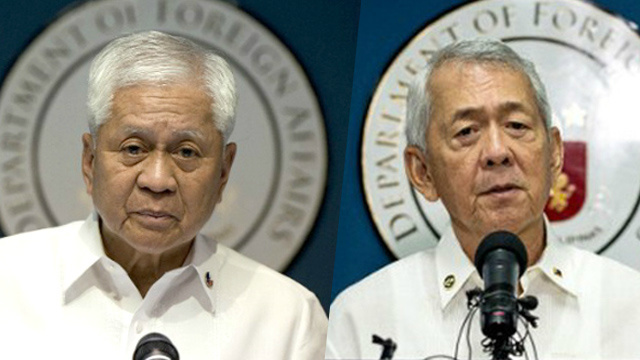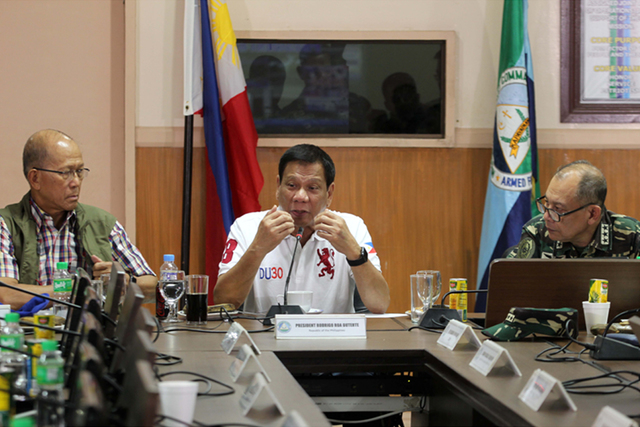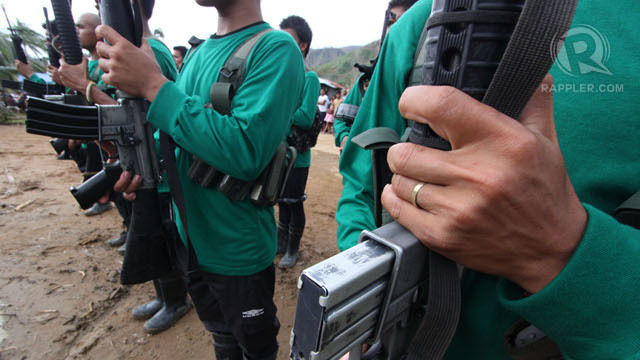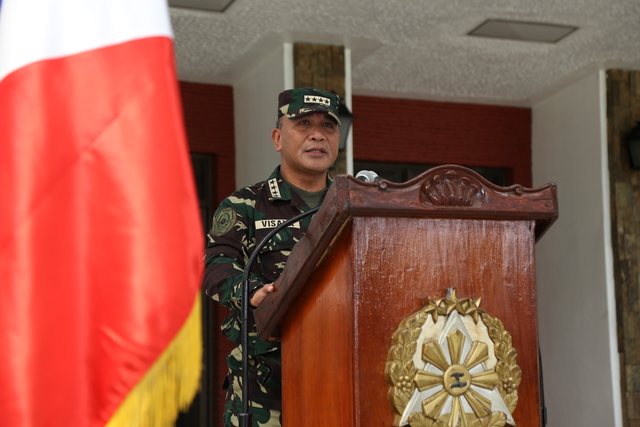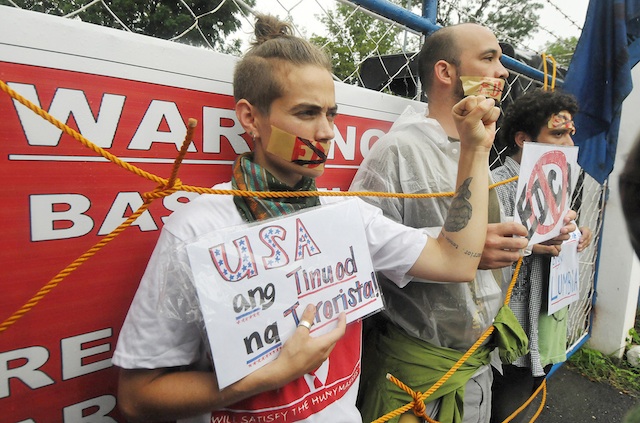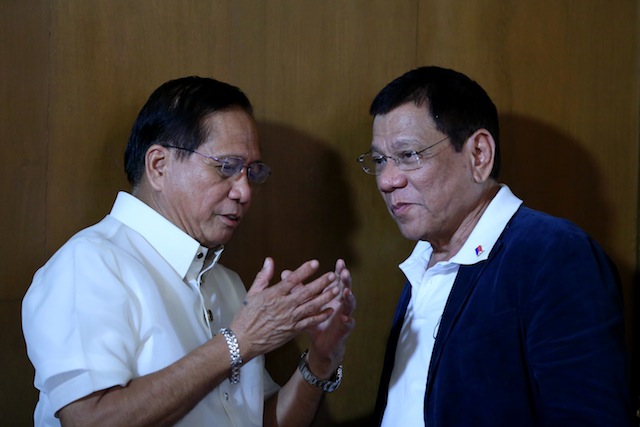From Rappler (Jul 31):
Yasay contradicts Del Rosario, adopts one of China’s views
Unlike his predecessor, Foreign Secretary Perfecto Yasay Jr says the historic case filed by Manila against Beijing 'concerns China and the Philippines alone'
 OLD AND NEW. Former Foreign Secretary Albert del Rosario (left) and current Foreign Secretary Perfecto Yasay Jr hold different views about the Philippines' case against China. Del Rosario's photo by AFP; Yasay's photo by EPA
OLD AND NEW. Former Foreign Secretary Albert del Rosario (left) and current Foreign Secretary Perfecto Yasay Jr hold different views about the Philippines' case against China. Del Rosario's photo by AFP; Yasay's photo by EPA
Spot the differences.
Exhibit A: "The case before you is of the utmost importance to the Philippines, to the region, and to the world."
Exhibit B: "The case we filed before the arbitral tribunal with respect to our dispute with China concerns China and the Philippines alone."
"Exhibit A" is a quote from former Philippine Foreign Secretary Albert del Rosario.
The context is Del Rosario’s opening statement on July 7, 2014, before an arbitral tribunal at the Permanent Court of Arbitration (PCA) in The Hague. The tribunal was hearing the Philippines’ case against China over the West Philippine Sea (South China Sea), which the Philippines won on July 12 this year.
"Exhibit B" is a quote from Del Rosario’s successor, Philippine Foreign Secretary Perfecto Yasay Jr. The context is Yasay’s press conference on Wednesday, July 27. Yasay was recounting the recent meeting of the Association of Southeast Asian Nations (ASEAN) in Vientiane, Laos. He was also discussing the way forward in the South China Sea dispute.
Before Wednesday’s press conference, Yasay said the same thing when he justified why he didn’t want ASEAN to cite the Hague ruling in its joint communiqué.
Yasay told reporters in Laos, "Hindi naman kasama 'yung ibang nasyon doon sa pag-file natin ng kaso sa arbitral tribunal, so bakit tayo mamimilit na ilalagay ‘yan sa ASEAN statement?" (The other countries are not part of our filing of the case before the arbitral tribunal, so why would we insist that it be put in the ASEAN statement?)
Referring to the South China Sea row, he also said in Manila that "resolving this dispute within the context of international law,” particularly the United Nations Convention on the Law of the Sea (UNCLOS), "is a matter for China and the Philippines to resolve." (READ: Recording shows Yasay didn't want ASEAN to cite Hague ruling)
Yasay’s position – that the case in The Hague concerns "China and the Philippines alone" – contradicts Del Rosario’s view that the case is "of the utmost importance to the Philippines, to the region, and to the world."
It is a complete turnaround.
China's position
More than this, Yasay’s stance echoes China’s position. China believes that settling the South China Sea dispute should be limited to the "directly concerned countries."
China, instead, prefers bilateral or one-on-one talks directly with the countries involved.
"We do not wish to see the Philippines get other countries involved and get them to take sides over the issue," Chinese Foreign Ministry spokesman Liu Weimin
said in 2011.
In the case of Yasay, he believes that the South China Sea issue "is a matter for China and the Philippines to resolve."
With Yasay as top diplomat then, the Philippines is hewing more closely to China’s position that the South China Sea dispute should be limited to the "directly concerned countries."
Experts, however, say it is crucial for the Philippines to get ASEAN’s support for the ruling despite China’s objections.
'Case affects region'
In an e-mail to Rappler, Asia Maritime Transparency Initiative director Gregory Poling said on Friday, July 29, "I agree that the ruling itself is only binding upon the Philippines and China, but it certainly affects other claimants and the region more broadly."
Poling cited the striking down of the 9-dash line, China’s demarcation to claim the South China Sea. He said this means the 9-dash line "is also illegitimate where it overlaps with the claims of Vietnam, Brunei, Malaysia, and Indonesia."
To illustrate, he said, "if the Spratlys are rocks for China and the Philippines, then clearly they are also rocks for the other claimants to them."
"This was a victory for the primacy of international law and norms as the organizing principle for Asia – not the might-makes-right system preferred by Beijing – and as such, it was a victory for all concerned states," Poling said.
He continued: "It is disappointing, but not surprising, that the rest of ASEAN has been unwilling to stand up and be counted supporting this ruling from which they will benefit. And that goes beyond the ASEAN statement – none of the Southeast Asian states except Vietnam has been willing to individually endorse the ruling."
Standing up for rights
Paul Reichler, the Philippines’ lead counsel against China, earlier said that the support of other coastal states in the region is crucial.
Reichler said that "although the award is legally binding only on the two parties, China and the Philippines, it has very strong implications for other coastal states in the South China Sea."
"If these other states stand up for their rights in the way that the Philippines has done, you'll get the situation where all of the neighboring states are insisting that China withdraw its illegal claims and respect their legal rights which have been defined and recognized and acknowledged today, because those states have the same rights as the Philippines," he said.
Prashanth Parameswaran, associate editor at The Diplomat magazine, also asserted the need to factor in global and regional needs in Duterte’s approach toward the South China Sea dispute.
In a Thought Leaders piece for Rappler, he said that "the real danger of Duterte’s approach to China and the South China Sea is that his administration will seek to engage Beijing in a way that not only undermines Philippine interests in terms of its relationship with China, but undercuts the regional unity and global solidarity needed to constrain Chinese assertiveness in the South China Sea."
Yasay and Duterte's policy
For all these, the bigger context
is Duterte’s policy not to flaunt the Hague ruling in an effort to improve ties with Beijing.
In fact, one of the things Yasay suggests
is sharing resources with China in the West Philippine Sea – never mind that he is talking about the Philippines’ exclusive economic zone (EEZ), which, experts stress,
is "exclusive."
Poling pointed out to Rappler, "Secretary Yasay is implementing President Duterte’s policy, so ultimately the way forward must be decided by Malacañang."
Poling said Duterte’s policy, as far as we know, "is to pursue talks with Beijing to de-escalate and hopefully find a system of resource-sharing to manage disputes, but to do so within the bounds laid out by the PCA ruling."
"That is a sound path, and one that the US and all interested parties should support. But it needs to be pursued with open eyes," he said.
Poling explained that maybe "Manila is right to hold out the chance of compromise to China." On the other hand, he said, Manila "should also be preparing for the real possibility that China is just biding its time," until after international attention drifts following regional meetings like the Asia-Pacific Economic Cooperation (APEC) Summit.
Poling said: "That is why Manila should also be pushing other states to endorse the PCA ruling, so that the spotlight does not disappear – already the ruling risks becoming little more than a footnote as no member of Europe and almost no member of ASEAN is willing to endorse it."
Del Rosario himself, for one, told reporters that ideally, Yasay "should have stood strongly for promoting the arbitration ruling as being part of the final statement."
This ASEAN statement ended up including common issues surrounding the South China Sea, such as China’s land reclamation activities,
but not the Hague ruling.
Yasay: 'Diplomatic triumph'
Still, in a Facebook post, Yasay said the joint communiqué was a "diplomatic triumph" for the Philippines.
On one hand, he has been criticized for not pushing to explicitly include the Hague ruling in the joint communiqué.
On the other hand, he said, "there are many ways to skin a cat."
He explained that unlike his predecessors, he helped in crafting an ASEAN statement that urged China "to desist from its reclamation activities." While the statement ignored the specific Hague decision, Yasay said it upheld international law and UNCLOS.
"The core message implicitly but undeniably conveyed by this ASEAN statement and joint communiqué called for all parties to respect the ruling of the arbitral tribunal without using the hard-line language demanded by my predecessors," Yasay said.
It is, however, not only about the language.
It is also about the premise of the case: Does Yasay think ASEAN has a stake?
Exhibit B shows that this is what Yasay, unlike Del Rosario, believes: "The case we filed before the arbitral tribunal with respect to our dispute with China concerns China and the Philippines alone. And resolving this dispute within the context of international law and UNCLOS is a matter for China and the Philippines to resolve."

